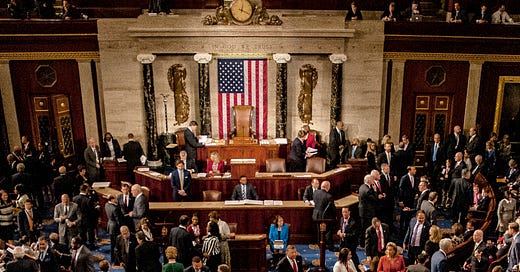Why House Republicans Can't Pick a Speaker
The problems in the House are the manifestation of the GOP's larger challenges
After two weeks, two candidates, and three failed votes, the House of Representatives is still paralyzed. Because Republicans can’t agree on a Speaker, the House cannot pass bills to fund the government, provide aid to Ukraine, or even pass a simple bipartisan resolution supporting Israel. There is no end in sight. No easy solution.
Electing a Speaker is the legislative equivalent of spelling your name correctly on the SAT and yet, Republicans can’t even accomplish this basic task without a maximum of drama and a minimum of competence. The Occam’s Razor answer is that the Republican Caucus is simply a rogue’s gallery of inexperienced dunderheads from gerrymandered districts with the political acumen of yams. This is the main culprit, but other factors contribute to the broader trends shaping the Republican Party.
1. A Party Divided
The general narrative of the two parties states that Democrats are a diverse, cacophonous party stretching from AOC to Joe Manchin, while Republicans are a more ideologically, demographically, and geographically homogenous group. This assessment is largely true. The Republicans look alike (are mostly white), more concentrated in certain parts of the country (rural areas), and tend to get their information from the same place (Fox). While they are united by their hate of Democrats (and immigrants, science, reproductive freedom, etc.), the various Republican factions agree on very little.
Keep reading with a 7-day free trial
Subscribe to The Message Box to keep reading this post and get 7 days of free access to the full post archives.



